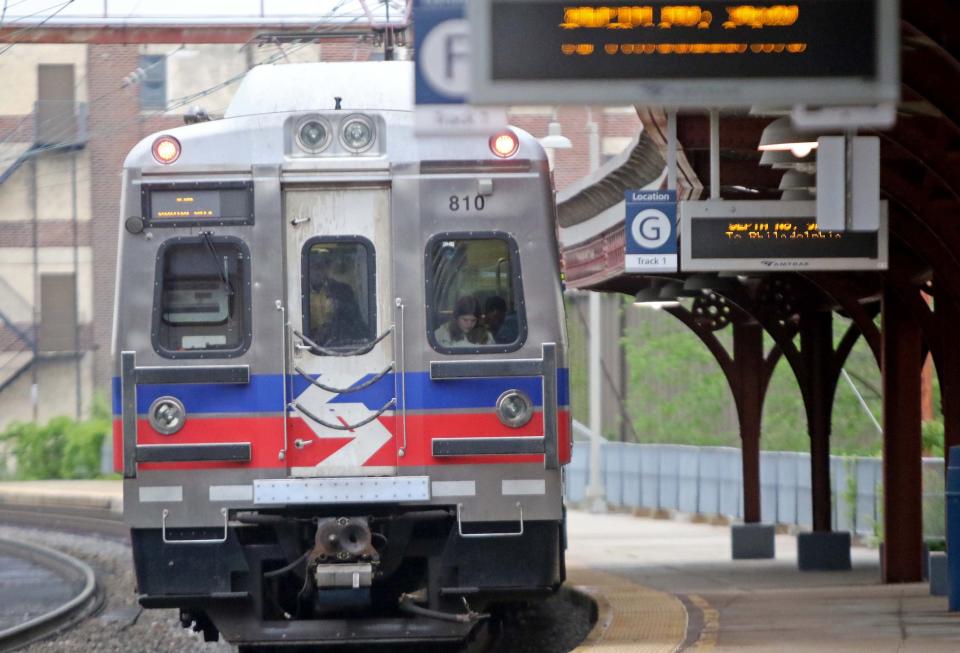Delaware needs express trains to Philly — and soon. Here's why | Opinion
For those who follow SEPTA on Twitter, you’ve probably noticed that train service to and from Delaware has been dogged by delays, with many trains running 10 or 15 minutes late, which for some commuters is just enough to make a long trip feel unbearable. Even on a good day, the typical travel time for SEPTA commuters between Wilmington and Center City is nearly one hour, and the ride to Newark can reach 90 minutes.
There are several reasons why SEPTA takes so long:
Distance: The Wilmington-Newark line is one of the longest routes in the SEPTA regional rail network, with Newark station nearly 40 miles from Center City. Other longer routes have either an “express” or “high speed” train, but Delaware does not.
Tracks: Amtrak owns the Northeast Corridor and therefore its trains get priority, which wouldn’t normally be a problem except that SEPTA operates at speeds much slower than Amtrak, which means local trains must stop at bottlenecks and wait for Amtrak to pass.
Stops: SEPTA stops at 13 stations in Delaware County between Claymont and Penn Medicine Station. Some of those Delco stations, like Eddystone, service fewer than 50 people per day, which means trains are often stopping at empty stations.
SEPTA is only able to sustain adequate ridership on this line because of Delaware commuters and businesses in Delaware that attract Pennsylvania workers. Four of the five busiest stations on the Wilmington-Newark line outside of Center City are in Delaware, with Wilmington and Claymont each serving several hundred people daily — more than 10,000 weekly — and Wilmington is the only station outside Center City that sees significant inbound and outbound traffic during rush hour.

It’s long past time for Delaware to explore options for running its own express trains into Philadelphia.
Riders currently wishing to take a true express train between Delaware and Philadelphia have only one option: Amtrak from Wilmington to 30th Street Station. Amtrak is fast, the trains run frequently, and tickets can sometimes be found for under $10, but express service between only two stations on a 40-mile line is not helpful for commuters traveling to Penn Medicine, Claymont, or University of Delaware.
Rather, an ideal express train from Delaware to Philadelphia would include stops at all Delaware stations and then bypass all stops in Delaware County. Once in Philadelphia, the train would stop at Penn Medicine, 30th Street and finally Suburban Station, where “stub” tracks are available for express trains to switch direction.
How could it work?
How would this work? For starters, the express train needs to be fast — like, as fast as Amtrak. SEPTA’s iconic Silverliners have a maximum operating speed of 110 mph, but that’s not fast enough. Some sections of track between Delaware and Philadelphia have speed limits of 125 mph, the maximum operating speed for Amtrak’s new electric locomotives, which can make the trip in about 20 minutes. Although some of these locomotives have been purchased by SEPTA to provide high-speed service in other sectors of the regional rail network, they are not in service on the Wilmington-Newark line.
So first, Delaware should look into bolstering its train fleet beyond the handful of Silverliners that we currently own so that our trains can operate at higher speeds to reduce travel times.
Second, once Delaware has express trains that can travel at speeds comparable to Amtrak, then it should negotiate to operate those trains on the Northeast Corridor’s inner “express” tracks between Claymont and Penn Medicine stations. This section of the Northeast Corridor is far from operating at full capacity, even with an annoying bottleneck just north of Wilmington. If anything, faster express trains should operate more fluidly with Amtrak than SEPTA’s current rolling stock.
Third, there’s scheduling. To better service Delaware commuters, express trains should provide all service south of Wilmington, which means at a minimum there should be four express roundtrips between Delaware and Philadelphia during the morning and evening commutes to match current service to Newark — ideally timed to benefit the greatest number of riders. However, with travel times cut in half, it’s possible that even more commuters will adjust their travel plans to ride an express train and thereby create demand for more daily roundtrips.
Lastly, with its own fleet of trains, Delaware should be able to bolster rail travel within the state. Make the price for in-state rail the same as a bus ticket and see what happens.
This may sound like a big dream, but it’s not nearly as complicated and expensive as a direct train to Philadelphia International Airport. All we need are political leaders who can get it done.
Jordan Howell is a freelance writer who lives in Wilmington.
This article originally appeared on Delaware News Journal: Delaware SEPTA Wilmington-Newark line needs express trains to Philly

